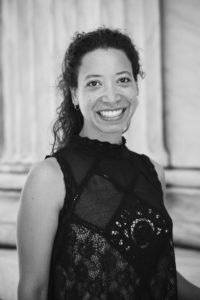Adrienne Taylor
Adrienne Taylor is a resident musician and director of the Daily Orchestra Program, which she founded in 2012 to combine the core principles of Community MusicWorks with ideas and practices from El Sistema, Venezuela’s youth orchestra and social action program. Adrienne collaborates regularly with artists in film, theater and dance, and especially enjoys working with composers. She recently recorded for an upcoming album by Cape Verdean singer-songwriter Benvindo Cruz.
When I first heard about Community MusicWorks I was living in Portugal playing in an orchestra. I was visiting my parents in Pennsylvania when I got an email about applications for the fellowship program. I had never heard of Community MusicWorks before. I was surprised and delighted that something like this exists because so much of what the organization was about lined up with what I hoped to be as a musician. A lot of times, if I see an opportunity, I’ll tend to keep it in the back of my mind before actually acting. This time I immediately picked up the phone. When they invited me to come and be a fellow, it was really exciting, but it was also hard. I had a full-time job as a musician. I was also in a relationship, which is what brought me to Portugal. I wasn’t sure what I should do. But it pulled me. If something comes along that aligns in an incredible way with what you hope to do in your life, then you have to choose that even if you don’t know what it will lead to.
I felt nervous about teaching when I first came. I started teaching music when I was a teenager. I taught here and there during school like a lot of people do, and then I was out of it for a while and just playing. I was expecting it to be challenging and it was. So much of our teaching here is about the relationships. Teaching is, always, of course about relationships but here it’s on a different level. The primary goal is to develop a meaningful relationship. When you recognize that there’s a need in a student that’s not being met at home in some way, you want to be everything for the student. I’m going to try to talk about this without getting too emotional. Sometimes you just want to take them home with you, you know? And you can’t do that. You have lots of different students and you have to care for them all.
With Daily Orchestra, in some ways it’s easier. I see the same students every day. You can see the ups and downs. There’s something really nice about that. We’re all going through our lives together. I feel lucky to go through life with them. The kids that have been with us since the beginning of the Daily Orchestra Program feel like our babies. A lot of parents are working such difficult hours that they might only spend an hour or two with them before they go to bed. When you think about what a big piece of their interaction with adults is in the orchestra program, it’s like, “Wow, we better try to do this right.”
After finishing the fellowship, of course, they make you leave, which is [chuckles] sad. It’s really hard to leave. But then, there was this opportunity to participate in the Sistema Fellows Program at New England Conservatory. It was neat to be able to immerse myself in the Community MusicWorks experience and then to immerse myself in all things El Sistema. After that I was really motivated to start something. I remember the second weekend in Venezuela watching what was happening and seeing the enthusiasm and the love and the closeness of the students and the teachers with so much intensity that it was like, okay, I’m ready to go back. I was so inspired.
But then actually doing it is another story. I didn’t know where I was going to be or how it was going to start. I didn’t know that Providence could be an option. So I looked around at cities in New England. I was on the computer looking into different cities and what their makeup was and what their history was, getting information and statistics for specific neighborhoods and trying to figure out what would be just the right place to start this program. I really didn’t have an idea of where to start.
Over time I started talking with Sebastian about the ideas I was having about a program and it seemed like it might be possible to try and do it here. This of all places was where I felt already the strongest sense of community. I thought there was a lot of potential also to see what might be different with students who were able to do something every day as a group. It intensifies the relationship building. And then also musically, the Daily Orchestra program is different. It can be so challenging for young people to go home and sit in a room by themselves and practice a piece of music. First of all, if you don’t have anybody encouraging you to do that regularly, then it’s really rare to be self-motivated. Even if they’re motivated to learn to play music, for them to stop whatever else it is they’re doing and say, “Okay, it’s my practice time. I’m going to go and spend 40 minutes in my room playing scales,” that’s a lot to ask. Some of our students don’t have even a space to do that. It’s really difficult to practice while people are right next to you making dinner or having conversations. So it’s nice that they can just come to Daily Orchestra and their instruments are there and their friends are there and they can just play together. They can build a big musical foundation that way.
Our pilot year was a fairly small group. It was about a dozen kids. It fluctuated in the beginning, which we expected, because it was a brand new thing. It was great that it was at John Hope Settlement House. Peter Lee (former director) was really enthusiastic about bringing music to John Hope Settlement House. And I felt strongly about having the program embedded in an existing community center where there was already an afterschool program. I was hoping to involve children that might not necessarily have signed up for Community MusicWorks because their parents maybe work after school or don’t have a way to transport them from school to lessons or from home to lessons after school.
What’s really challenging for me is the teaching and the playing, both of which are really rewarding. Each is something that I could devote all of my energy and time and mental space to, and I’m always trying to get better at both. Especially with younger students, there’s so much to think about. Each student is so different. You want to find the best approach. Also, working with a group of students is a whole different challenge. You have to think about how to guide them without being dictatorial but giving them the structure that they need to thrive. With playing, of course, it’s an endless road. There’s always more to do. I’m always working to try to be a better musician and I could easily spend my entire day practicing, listening to music, trying to be a better musician.
The best part about working at CMW is the people. Of course. [Laughs] Yeah, the people. I feel grateful pretty much every day to work with a group of people that I feel really supported by and that I care about and that are really honorable human beings. And also, of course the students, who maybe aren’t aware of the importance of the role that they play in my life. And also, the board–all of the people supporting the work in all different ways.
Back to the 20 Stories homepage.


